A page dedicated for candidates offered admission to the MHCI+D Class of 2026
CONGRATULATIONS
The Master of Human-Computer Interaction and Design (MHCI+D) program is thrilled to offer you admission to the Class of 2026!
We hope that you will accept this offer – your unique talents, skills, and perspective would be an asset to the incoming cohort. Nonetheless, we also understand that you have a big decision to make. This page is meant to give you a thorough glimpse of life at MHCI+D and information while you decide.
Pre-decision webinars
We offer(ed) a number of online sessions (most recorded) to talk with current students, faculty and staff, to learn everything you can about our program and UW. Can’t make some of these? We understand the different time zones, work and other commitments may make it difficult to attend all sessions.
Check back after each session, and we’ll post the recording link. A schedule and list of recordings of sessions are included below:
- March 25 (Tuesday) at 4:00 PM (Pacific Daylight Time) Overview & Academics of MHCI+D with Student Services Director, Matt Bartels, Graduate Advisor, Michelle Barreto, and select faculty as we discuss the program, the courses and the year to come. RECORDING .
- April 1 (Tuesday) at 4:00 PM (Pacific Daylight Time) Career Development & Outcomes Join the student services team as they discuss the career development programming one can expect next year with an overview of career outcomes we’ve seen post commencement. RECORDING
- April 7 (Monday) at 4:00 PM (Pacific Daylight Time) Sit in on Research Studio Class with Professor Sara Richards. Virtually experience a class session (Zoom Link to be shared via email).
- April 8 (Tuesday) at 4:00 PM (Pacific Daylight Time) Open Forum with Current Students Admissions Ambassador, Christian Chiang and other students discuss their first hand experience and tips on what to expect. RECORDING
Talk with us!
- Meet with Assistant Director of Student Services, Matt Bartels. Schedule a 1:1 Zoom meeting with Matt to discuss your questions. Email Matt at mhcid@uw.edu to book a time.
- Meet with Admissions Ambassador and current student, Christian Chiang. Schedule a 1:1 Zoom meeting with Christian to discuss any questions you may have from a student’s perspective.
- You will soon receive an invite to a Slack channel with current students. This will be a great forum to casually meet with each other and current students.
how to Accept the offer
Accepting the offer is a two-step process:
- Notify us that you accept the offer by changing your status in the application system. This will trigger a notification to you with your UW student ID number and with information on how to pay the non-refundable $500 deposit.
- Pay the non-refundable $500 deposit, which will be applied to your Fall Quarter tuition. Once you have paid the deposit, you be part of the Class of 2026. Congratulations!
Please allow time for wire transfer or other financial transactions so that your $500 deposit is RECEIVED by the decision deadline. As a result, your spot will be secured before we initiate the waitlist. Contact us immediately if you anticipate any delays in completing the deposit.
Should you decide to decline the offer, please notify us as soon as possible by changing your status in the application system.
Additional information for international students. For details about visas and other information see the following UW Grad School page.
exploring all things mhci+D
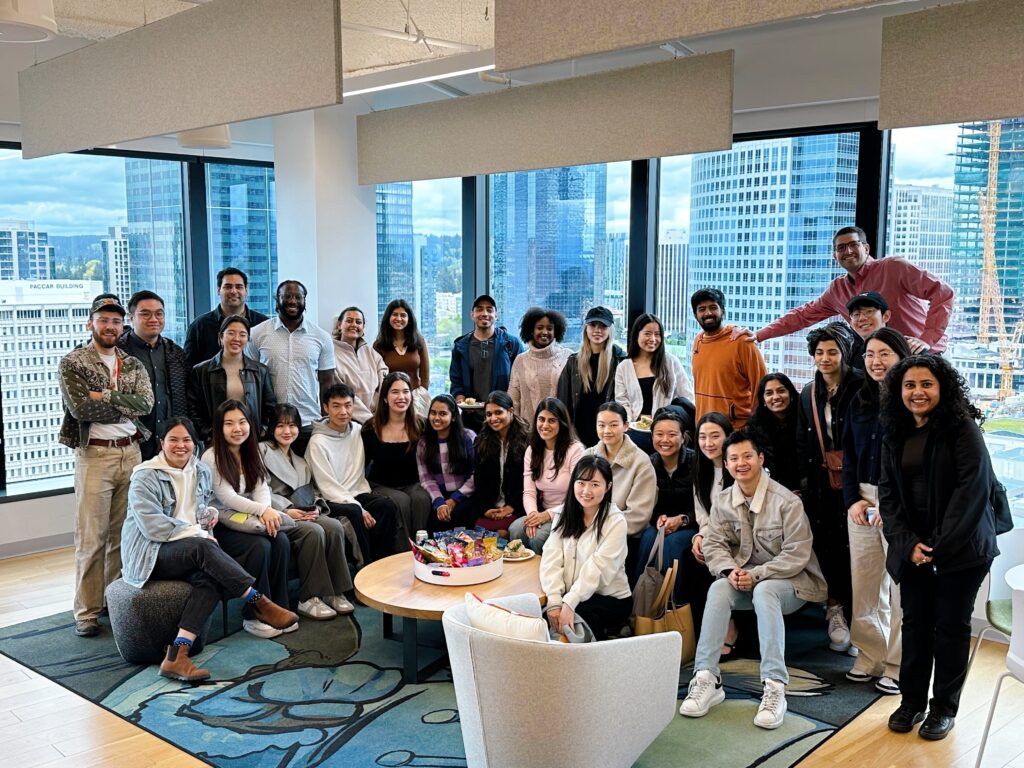
In the following sections, the MHCI+D staff and former students have curated information that previous candidates have found useful in exploring MHCI+D.
Why did you choose MHCI+D? The Class of 2022 reflect on their decision
The Student Experience: Former students describe what it’s like in the MHCI+D program and what their fellow students bring to the experience.
Where to live in Seattle: Each neighborhood in the the Emerald City holds a distinctive charm. In the videos below, members of the Class of 2022 advocate for their homebase.
University of Washington housing around campus
The University District
The University Village
Eastlake
Capitol Hill
Roosevelt
Where to EAT around the U District!: Join the Class of 2024 as they share some of their favorite places to eat around the studio and campus.
The curriculum
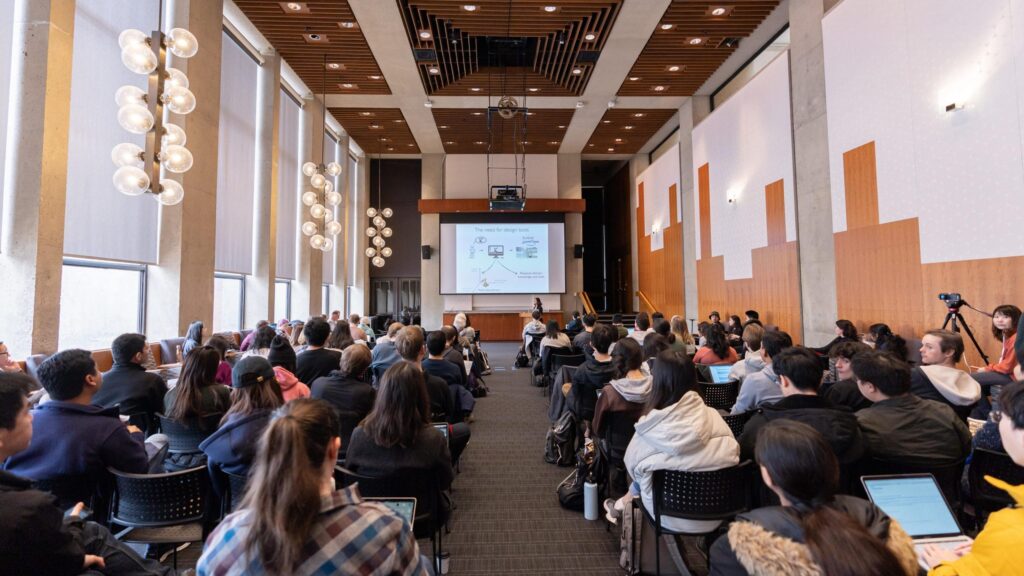
The following section will give you a snapshot of MHCI+D academia. For a more in depth look, view our curriculum page here.
Immersion Studio
In the first week of the program, students complete a one week “Immersion Studio.” Each year’s challenge is different; it will orient new MHCI+D students to core ideas and terminology in HCI and design and provide some key skills that will be instrumental in success in a studio learning environment.
Ideation Studio
In fall quarter, Ideation Studio has student teams respond to a challenge related to changing human behavior through technology.
Prototyping Studio
In winter quarter, Prototyping Studio allows students to explore physical computing, hardware and software integration, and alternative input and output modalities. Professors Jon Froelich and Andy Davidson describe the process in this video.
Capstone Studio
Capstone projects are the culmination of the program (not the starting point). Teams typically consist of three or four students, and an industry advisor provides guidance and advice. Capstone projects span three quarters and challenge you to design a solution to a real-world problem using all the skills you have developed. Examples from the Cohort 11:
- Obscura, Class of 2024
- Crumbz, Class of 2024
- Cece, Class of 2024
- Hiya Helper, Class of 2024
- Ubuntu, Class of 2024
- Social Grocer, Class of 2024
- AiR Agent, Class of 2024
- Copreneur, Class of 2024
- Echos, Class of 2024
- Somni, Class of 2024
The Faculty
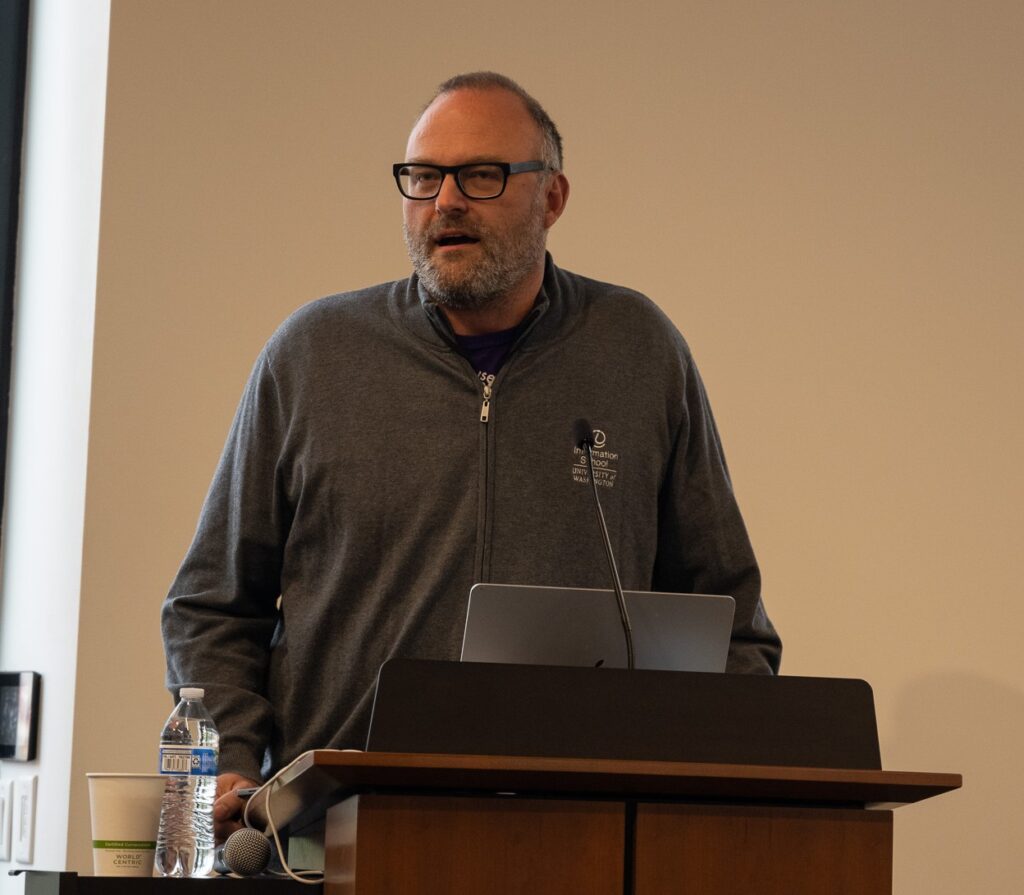
Hailing from multiple concentrations throughout the four departments that make up MHCI+D, our faculty are steadfast in enabling, yet challenging the MCHI+D student body in getting the most out of their graduate school experience. The current faculty roster can be found here.
Faculty Talks
Watch and read recent talks and blogs by faculty involved with the program:
- Ana Pinto da Silva , Current MHCI+D Program Director, reflects on Design Leadership in this article, Leading Relevance: Design Innovation and the Future Possible
- Jon Froehlich, Computer Science & Engineering, instructor for “Prototyping Studio” core class, and co-chair of the MHCI+D Faculty Committee. A UW article profiled Project Sidewalk, the accessibility project he has been leading through his lab, the Makeability Lab [link]. A Spring, 2023 CHI Paper Jon CoAuthored: Codesigning Videoconferencing Tools for Small Groups with mixed hearing status. [link[
- Amy Ko, Information School, instructor for “User Interface” core class, wrote two articles recently about how large language models will change programming either a little , or a lot
- Jeff Heer, Computer Science & Engineering, Faculty Committee member and instructor for “Data Visualization” elective. Podcast interview from ACM discussing his work [link]
Faculty Shorts on Selected Electives:
- Axel Roesler, Division of Design, School of Art, Art History + Design. Foundations of Interaction Design elective [link] and Advanced Interaction Design elective [link]
- Daniela Rosner, Human-Centered Design and Engineering. Visual Communication elective [link]
- Gregg Gottesman, Computer Science & Engineering. Entrepreneurship [link]
- Jacob Wobbrock, The Information School. Designing Information Experiences elective [link]
- Jeff Heer, Computer Science & Engineering. Data Visualization elective [link]
- Sean Munson, Human Centered Design & Engineering. Usability Studies elective [link]
career
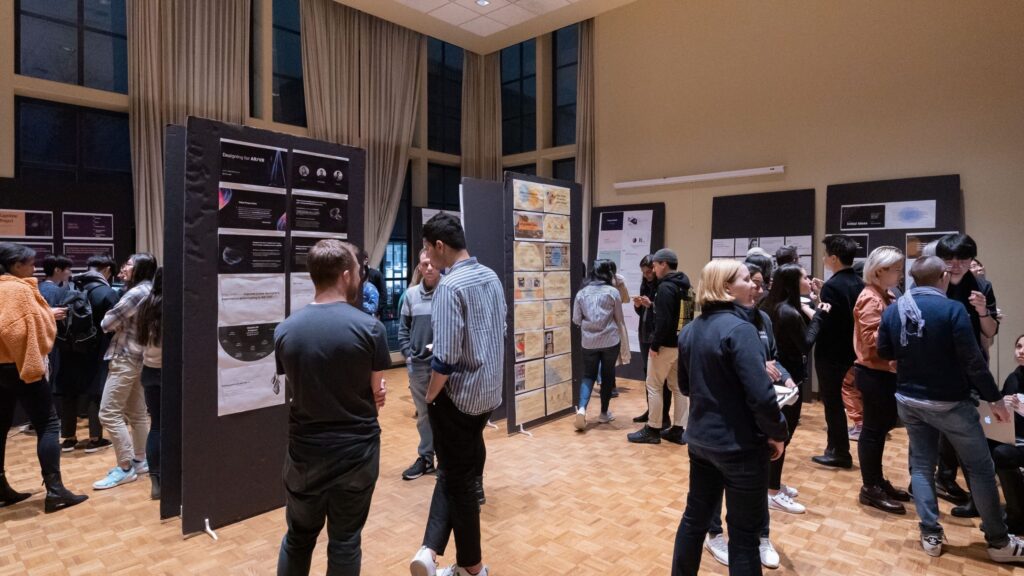
MHCI+D graduates are in demand. You can expect to leave the program ready to find meaningful and rewarding work.
Be sure to join the Career Overview webinar on April 1 for details. We’ll be diving deep on all the career development programming you can expect while a student (or alum!). We’ll also talk about career outcomes from recent years and discuss where our alumni have been finding work recently. In the meantime, refer to the following pages on our site:
costs and finances
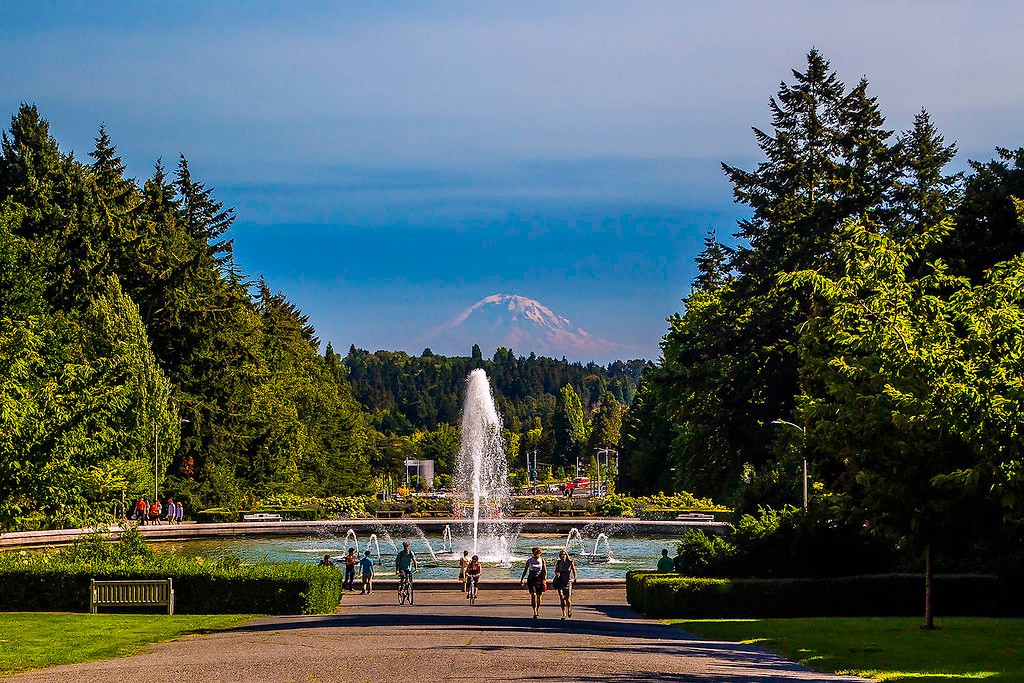
Financial Aid: In general, as an intense professional program, this is not designed to be work-compatible and because this is a fee-based program, many sources of state funding are not available. The majority of students meet the majority of their financial needs via loans, savings, or family support.
GSEE Supplemental Finance Awards: Merit-based financing for U.S. students from underrepresented groups. We have had students receive this award in the past. If interested in applying, contact us immediately at mhcid@uw.edu to get started on the award application process.
Working during the Program: You should not plan to have enough time to work full-time while in this program. A few students are able to hold down positions generally asking for 8-10 hours / week, but that is about the maximum you might manage. Some students have started the year with part-time consulting or freelance work, but most have found this is too taxing and distracting and have let these go mid-year. Each year we hire 3-4 students to assist with social media, website design,videography and other tasks. A few students are able to arrange paid work with one of the UW’s research projects. This is usually arranged part way through the year and after talking with the professor/research lead. Finally, a few other students have taken other light work-study positions, but these are generally less than 10 hours per week.
The UW Library provides a clearinghouse of funding opportunities for graduate students, the Graduate Funding Information Service, for opportunities that may arise throughout the year. Be sure to read qualification limitations carefully to see if any opportunity applies to fee-based [not state-sponsored] programs.
Additional Expenses: We work hard to keep you from having to buy little things throughout the year. So we provide refreshments in the studio, a high-quality printer/copier/scanner (although occasionally you may need to print elsewhere to meet a deadline), all in-class and prototyping materials for core classes, access to the studio Cricut cutter, 3-D printer, video-quality hard-drive, and large-screen monitors. Each quarter, your team will have a budget for relevant purchases, such as gratuities for research participants or specialized materials for your capstone project. What we don’t provide is materials or gratuities for your elective courses, meals, housing, dog sitting, etc.
UW and Seattle

- DUB: Bringing together the broader UW HCI community of faculty and students, “DUB” or “Design Use Build” is the MHCI+D program’s founding organization. DUB holds weekly seminars, an annual retreat, and a chance to network with others from a wide range of disciplines, programs, and departments.
- UW Career & Internship Center: The campus-wide career center offers workshops, industry and employer information sessions and other events nearly daily. They also organize career fairs throughout the year that offer a chance to connect with hundreds of employers.
- Seattle HCI community: Beyond campus, Seattle has a vibrant HCI scene, with hundreds of professionals working in the field at local companies. UX meetups, hackathons and conferences offer students frequent opportunities to get to know their future colleagues.
A few of the more active organizations include:
CONTACT US WITH QUESTIONS ANYTIME: MHCID@UW.EDU